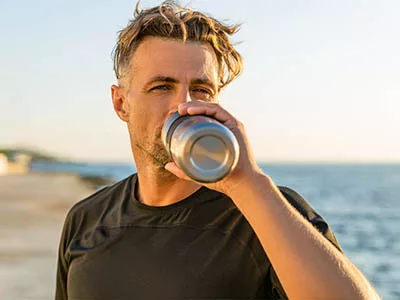
How Dehydration Increases Body Pain
In our daily lives, we often underestimate the importance of proper hydration. We are frequently reminded to drink enough water for our overall well-being, but did you know that dehydration can also have a significant impact on our body's pain levels? Yes, that's right! Dehydration goes beyond simple thirst; it can exacerbate existing pain and even cause new discomfort.
What is Dehydration?
Before diving into the connection between dehydration and body pain, let's briefly understand what dehydration is. Dehydration occurs when the body loses more fluids than it takes in, leading to an inadequate balance of water and electrolytes. This imbalance can result from various factors, including excessive sweating, inadequate fluid intake, illness, or certain medications.
The Role of Water in the Body
Water is essential for the proper functioning of our bodies. It serves as a vital component in numerous bodily processes, including maintaining body temperature, facilitating digestion, transporting nutrients, and cushioning our joints. When we become dehydrated, these processes are compromised, impacting our overall health and well-being.
Dehydration and Increased Body Pain
Water plays a crucial role in lubricating our joints and muscles. When we are dehydrated, the lack of proper hydration can lead to muscle cramps, stiffness, and general discomfort. This can be particularly noticeable in individuals who engage in physical activities or have physically demanding jobs.
Dehydration is a known trigger for headaches and migraines. When the body lacks sufficient fluids, blood volume decreases, leading to reduced oxygen and nutrient supply to the brain. This can result in throbbing headaches and severe migraines, intensifying existing pain or creating new discomfort.
Our joints contain a protective layer of cartilage, which needs adequate hydration to maintain its cushioning properties. Dehydration can lead to reduced cartilage lubrication, resulting in increased friction between the joints. This can exacerbate joint pain, especially in individuals with conditions such as arthritis.
Dehydration can also contribute to back pain. The spinal discs, which act as shock absorbers between the vertebrae, require water to maintain their flexibility and structural integrity. When dehydrated, these discs can shrink, leading to spinal misalignment, compressed nerves, and increased back pain.
Water plays a vital role in maintaining proper digestive function. When dehydrated, the body may struggle to produce sufficient saliva, stomach acid, and digestive enzymes, leading to indigestion, acid reflux, and abdominal pain.
Prevention and Management
The good news is that preventing and managing dehydration-related pain is relatively simple. Here are a few tips:
- Stay Hydrated: Drink an adequate amount of water throughout the day, especially when engaging in physical activities or spending time in hot environments.
- Monitor Fluid Intake: Keep track of your fluid intake and make a conscious effort to drink water regularly. Remember that thirst is a sign that your body is already partially dehydrated, so aim to drink water even before feeling thirsty.
- Eat Hydrating Foods: Include water-rich foods in your diet, such as fruits (watermelon, oranges), vegetables (cucumbers, celery), and soups.
- Limit Diuretic Beverages: Reduce the consumption of diuretic beverages like coffee, tea, and alcohol, as they can increase fluid loss.
- Seek Medical Advice: If you experience chronic pain or severe dehydration symptoms, consult a healthcare professional for proper diagnosis and treatment.
Dehydration is more than just feeling thirsty; it can have a direct impact on our body's pain levels. By recognizing the hidden link between dehydration and increased body pain, we can take proactive steps to stay properly hydrated and reduce discomfort. Remember, water is not just a beverage; it's a vital component of a healthy and pain-free life. Stay hydrated, stay healthy!
Are you struggling with pain in certain areas? Check out our painful Conditions web page to get solutions here: Painful Conditions | Superior Physical Therapy (thesuperiortherapy.com)
Check out what the Mayo Clinic says about Dehydration: Dehydration - Symptoms & causes - Mayo Clinic



